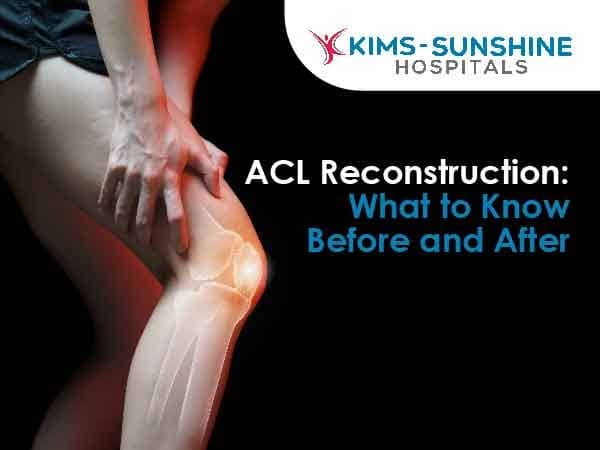
ACL Reconstruction: What to Know Before and After
By Dr. A. V. Gurava Reddy, Managing Director

If one thing athletes and active individuals are prone to, it is Anterior Cruciate Ligament (ACL) injuries. Many might opt for an ACL reconstruction surgery when the knee’s stability is compromised by a tear. Discover what to expect before and after ACL reconstruction surgery. Learn how preparation, rehabilitation, and patience contribute to a successful recovery for a strong, stable knee.
Before ACL Reconstruction:
- Consultation and Assessment: It is pertinent to consult an orthopaedic surgeon before undergoing an ACL reconstruction. They will examine the severity of the ACL injury, discuss your medical history and determine if surgery is the best course of action for your injury.
- Understanding the Procedure: Take time to understand what ACL reconstruction surgery is. The surgeon will replace the torn ligament with a graft, usually taken from the patient’s own hamstring or patellar tendon, or from a donor (allograft). Being in acknowledgement of the procedure helps alleviate some anxiety.
- Preoperative Physical Therapy: Strengthening and enhancing the flexibility of the knee muscles can be done to optimise the outcome of surgery and aid in postoperative recovery, by engaging in preoperative physical therapy.
- Preparation at Home: One can also prepare for an ACL surgery by rearranging their living space for comfort and convenience post-surgery. Set up a recovery area with necessary items within reach, and consider installing handrails or ramps if needed.
After ACL Reconstruction:
- Immediate Postoperative Care: Following surgery, you will most likely need to use crutches and wear a knee brace. The first few days are critical for pain management and swelling reduction. Follow the medication and icing routine that has been prescribed.
- Physical Therapy Begins: ACL reconstruction requires extensive postoperative rehabilitation. Physical therapy will begin soon after surgery, with the goal of restoring knee mobility, strength, and stability.
- Compliance with Rehabilitation Program: Following the rehabilitation programme requires consistency. Attend all scheduled physical therapy sessions and do the exercises prescribed at home. This dedication is required for a successful recovery.
- Gradual Return to Activities: Returning to sports or strenuous activities takes time. Rushing increases the likelihood of re-injury. Your healthcare team will walk you through a step-by-step process to ensure that you can safely return to your desired level of activity.
- Patience and Mental Well-being: Recovery from ACL reconstruction takes time. Patience is essential. It’s normal to feel frustrated or impatient at times, but staying positive and seeking support from friends, family, or a mental health professional can help.
Conclusion:
Anterior Cruciate Ligament reconstruction requires careful planning, commitment, and perseverance. Understanding expectations before and after the procedure ensures informed confidence in regaining strength, stability, and an active lifestyle.
The best orthopaedic hospital in Hyderabad, KIMS-Sunshine Hospitals, provides comprehensive care for a variety of orthopaedic issues, including ACL reconstruction. Whether you have ACL issues or any other orthopaedic condition, you can rely on KIMS-Sunshine Hospital for personalised care.
FAQs
Q. What are the risks and benefits of ACL reconstruction surgery?
A. ACL reconstruction surgery offers the benefit of restoring knee stability, but risks include infection, blood clots, and graft failure. Benefits include improved function, reduced instability, and a return to an active lifestyle, while risks involve surgical complications and a potentially lengthy recovery. Consult with a healthcare professional for personalised advice.
Q. How do I prepare for ACL reconstruction surgery?
A. To prepare for ACL reconstruction surgery, consult with your orthopaedic surgeon for guidance. Typically, you’ll need to undergo pre-operative assessments, follow any pre-surgery instructions, such as fasting, and arrange for post-operative care and transportation. It’s essential to understand the procedure and discuss any concerns with your surgeon.
Q. What should I expect on the day of surgery?
A. On the day of surgery, expect to arrive early, complete paperwork, change into a gown, and meet with the surgical team. You’ll receive anaesthesia, and the procedure will be performed. Afterward, you’ll recover in a designated area before being discharged or admitted for further care.
Q. What will my recovery be like?
A. Recovery varies based on individual factors and the nature of your condition. It may involve rest, therapy, medication, and a gradual return to normal activities. Consult your healthcare provider for personalised guidance.
Q. When can I return to my normal activities?
A. The timing for returning to normal activities after ACL reconstruction surgery varies, but it typically ranges from 6 to 9 months. Consult with your surgeon for a personalised timeline based on your progress and specific procedure.
Q. Which is the best hospital for ACL reconstruction surgery?
A. KIMS-Sunshine Hospitals in Hyderabad is renowned for ACL reconstruction surgery, offering top-notch expertise and facilities. Their experienced orthopaedic team ensures high-quality care and successful outcomes.






